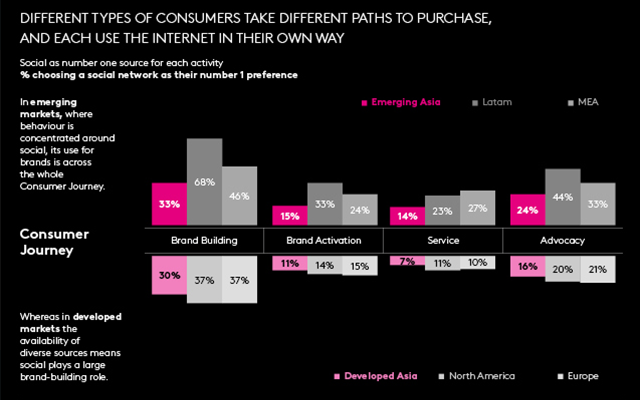 Connectivity has a fundamental influence on how people consume media and make brand choices. It gives brands the opportunity to increase reach exponentially. Our latest Connected Life study reveals that for nearly a third of consumers globally, brands don’t deliver an equal quality of service online and offline. Marketers need to better meet the personal expectations of their consumers across different touchpoints.
Connectivity has a fundamental influence on how people consume media and make brand choices. It gives brands the opportunity to increase reach exponentially. Our latest Connected Life study reveals that for nearly a third of consumers globally, brands don’t deliver an equal quality of service online and offline. Marketers need to better meet the personal expectations of their consumers across different touchpoints.
The consumer journey has changed dramatically in recent years.  Different consumers take different paths to purchase, each using the internet in their own way. Diversity of purpose creates multi-modal brand touchpoints, so one shopper’s point of purchase may simply be a source of product information for someone else, or another person’s go-to place for cool content. Trends in Europe show that consumers pass from social, to brand-owned, to offline touchpoints throughout the consumer journey. But in emerging markets there is a greater preference to interact with brands on social at all stages. These differences create big challenges for channel owners, forced to play multiple roles and juggle numerous requests.
Different consumers take different paths to purchase, each using the internet in their own way. Diversity of purpose creates multi-modal brand touchpoints, so one shopper’s point of purchase may simply be a source of product information for someone else, or another person’s go-to place for cool content. Trends in Europe show that consumers pass from social, to brand-owned, to offline touchpoints throughout the consumer journey. But in emerging markets there is a greater preference to interact with brands on social at all stages. These differences create big challenges for channel owners, forced to play multiple roles and juggle numerous requests.
In the year ahead, we’ll see the number of touchpoints available to consumers continue to grow. When comparing traditional digital touchpoints with mobile touchpoints marketers are facing a greater risk of delivering an inconsistent brand experience. Nearly 90% of internet users own a smartphone and the more connected consumers are, the greater the challenge becomes for brands. Marketers should also be aware of younger consumers who have grown up in a connected world. They are impatient with disjointed online/offline models that are older than they are, and will move away from brands that don’t adapt.
 To create a consistent brand experience, the first step is creating a single view of the customer. For example, in the Philippines, McDonald’s delivered a hugely successful campaign, bringing together social and OOH. Drivers, frustrated by being stuck in traffic, were encouraged to visit a McDonald’s drive-thru, where daily specials changed depending on the colour of their car. This is a good indication of the thinking required to align touchpoints into a single view, but true consistency will require considerable time and investment. For many established brands, this will be a longer-term focus on company structure and data management. But throughout all the likely changes ahead, marketers must concentrate on the experience they want to deliver to their customers; the essence of what they want their brand to be – and from there look at how it can be delivered across key touchpoints.
To create a consistent brand experience, the first step is creating a single view of the customer. For example, in the Philippines, McDonald’s delivered a hugely successful campaign, bringing together social and OOH. Drivers, frustrated by being stuck in traffic, were encouraged to visit a McDonald’s drive-thru, where daily specials changed depending on the colour of their car. This is a good indication of the thinking required to align touchpoints into a single view, but true consistency will require considerable time and investment. For many established brands, this will be a longer-term focus on company structure and data management. But throughout all the likely changes ahead, marketers must concentrate on the experience they want to deliver to their customers; the essence of what they want their brand to be – and from there look at how it can be delivered across key touchpoints.
Brands now need to focus on tone of voice; delivering a consistent experience, and identifying key touchpoints that will have the most impact and influence to deliver the best ROI.
Click to view full infographic.
Originally published by Kantar Millward Brown: Media and Digital Predictions 2017










